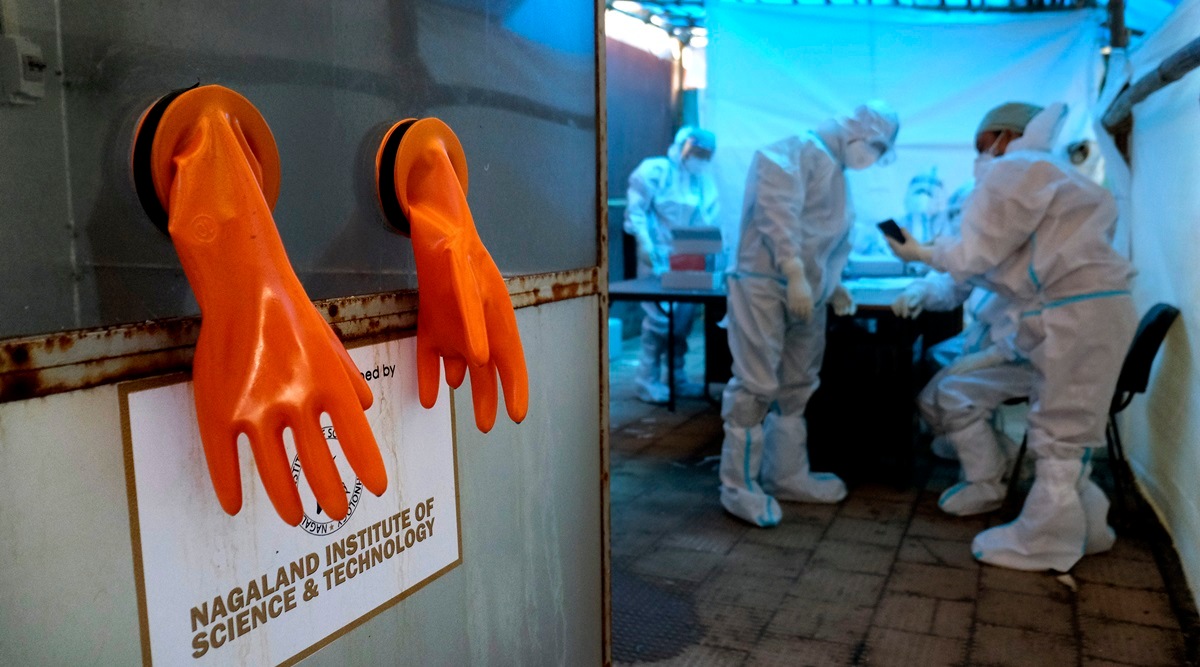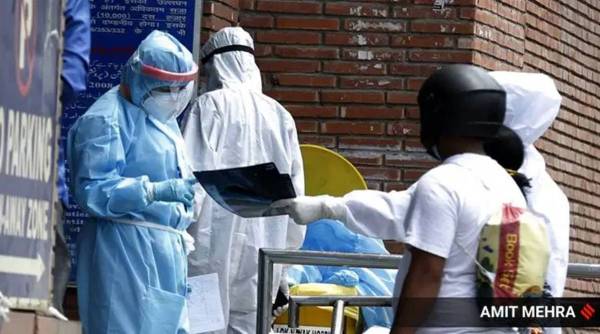 A pair of protective gloves hang by the testing booth, as health workers prepare for the day at a Covid-19 testing center in Kohima, Nagaland, Saturday, Oct. 10, 2020. (AP Photo/Yirmiyan Arthur)
A pair of protective gloves hang by the testing booth, as health workers prepare for the day at a Covid-19 testing center in Kohima, Nagaland, Saturday, Oct. 10, 2020. (AP Photo/Yirmiyan Arthur)Coronavirus India News Live Updates: Noting that the Covid-19 threat still persists, Prime Minister Narendra Modi Tuesday said people should not show any laxity towards the novel coronavirus, observe social distancing norms and maintain personal hygiene till a vaccine is available. He also said the concern is more in Maharashtra, which has reported the highest number of COVID-19 cases in India.
India reported 55,342 cases and 706 deaths due to the novel coronavirus in the 24 hours ending 9 am Tuesday, taking its caseload to 71,75,881, and toll to 1,09,856. India’s tally includes 8,38,729 patients who are undergoing treatment and 62,27,296 who have recovered.
Meanwhile, in an exclusive investigative series, The Indian Express has been tracking the untold story lockdown: a sharp surge in child trafficking. In the latest part of this series, we report how the Centre waved red flags on trafficking, but key states are yet to take action.
In another significant development, Johnson & Johnson Tuesday said it had temporarily halted the clinical trials of its Covid-19 vaccine candidate after a participant developed an unexplained illness. The company said the illness was being reviewed and evaluated by an independent board, as well as by an internal committee. (Don’t miss the latest from our Covid-19 vaccine tracker)
 At a Covid-19 centre in New Delhi. (Express Photo: Amit Mehra)
At a Covid-19 centre in New Delhi. (Express Photo: Amit Mehra)
COVID-19 patients and voters above the age of 80 will be given a postal ballot facility for the Maharashtra legislative council's graduates constituency election in Marathwada.
While the date of the election is yet to be announced, the district administration has come up with guidelines for voting, news agency PTI reported.
Italian Premier Giuseppe Conte has ordered strict new anti-coronavirus measures, including limits on private gatherings and a ban on casual pickup sports.
Conte negotiated with the country's regions to win limits on private gatherings, over the objections of some governors. Parties in closed spaces are banned, but the measures, imposed Tuesday, are limited to "strong recommendations" against private gatherings in homes with more than six people who don't live under the same roof.
Bars and restaurants must close by midnight, and drinks can only be consumed at tables "not while standing at the bar or outside" after 9 pm. Also banned are any contact sports that are not organized by an association that can maintain distancing rules. (AP)
The Election Commission Tuesday announced that elections for 11 Rajya Sabha seats – ten from Uttar Pradesh and one from Uttarakhand – will be held on November 9. The counting will also be held on November 9. The poll body said the government-mandated rules on social distancing will be strictly followed and masks, thermal scanning, use of sanitisers will be mandatory.
In the last Parliament session, Rajya Sabha bid farewell to 11 of its members who are due to retire in November this year. They include Civil Aviation Minister Hardeep Singh Puri, Samajwadi Party leader Ram Gopal Yadav, BSP’s Veer Singh and Raj Babbar of Congress. Others who will retire are: Javed Ali Khan (SP), P L Punia (Congress), Rajaram (BSP), Neeraj Shekhar (BJP), Arun Singh (BJP), Ravi Prakash Verma (SP) and Chandrapal Singh Yadav (SP). Read more here
There is a quiet proliferation of the Shiitake mushroom — an edible, nutrition-rich mushroom mostly grown in Japan and China — in the northeastern state of Nagaland. Hundreds of people have been spawning, harvesting, eating and selling kilograms and kilograms of the delicacy since the lockdown was imposed. "Enough to eat, and enough to sell too. It is a good income to have, especially in times like these... Before this, I didn’t even know that something called Shiitake mushroom existed," 45-year-old Temjen Wati says. Read Tora Agarwala's report
While releasing the autobiography of former Union minister Balasaheb Vikhe Patil via videoconference, Prime Minister Narendra Modi has commented on the pandemic. "Coronavirus danger persists... we will win the battle against Covid-19," he said.
Vaccine allocation will pose difficult questions, call for choosing between vulnerabilities. For instance, if the strategy is to give precedence to healthcare workers, should doctors who deal with infectious diseases get the first shot? Or should nurses, ward attendants, ambulance drivers be higher on the priority list? Among those with comorbidities, should the health of the elderly be secured first, or do relatively younger people, who need to travel more, have a more urgent claim? Should those who live in slums and congested areas get priority? Choosing from among different sets of vulnerabilities is never easy. Let the deliberations begin
During its latest press briefing, the World Health Organization (WHO) has cited India's Aarogya Setu mobile application as an example of the use of digital technology in the fight against Covid-19. Director General Tedros Adhanom Ghebreyesus said, "Digital technologies are helping public health tools more effective. Such as mobile applications to support contact tracing efforts.
"The Aarogya Setu app from India has been downloaded by 150 million users, and has helped city public health departments to identify areas where clusters could be anticipated and expand testing in a targeted way," he added. Watch the briefing here; he speaks of India around the 7th minute:
Assam Minister Himanta Biswa Sarma claims the state is "flattening the Covid-19 curve". He elaborates with recent state data on how the numbers and percentages are coming down significantly.
US President Donald Trump, who has now tested negative for Covid-19, returned to the campaign trail on Monday, three weeks ahead of the US presidential elections. Trump, who was seen without a mask in front of thousands of supporters in Florida, claimed he was now "immune to the virus".
Meanwhile, a health expert in the US, Dr Anthony Fauci, questioned the need to hold such a large rally, adding that those who recover from Covid-19 were likely to be immune for a limited period of time. Follow US Elections 2020 Live Updates
There are three levels of coronavirus risk -- medium, high or very high risk -- in Britain, according to new guidelines issued by the Boris Johnson government. Johnson said the system was designed to "simplify and standardise" a confusing patchwork of local rules, as the country enters a "crucial phase". He said the goal was to save lives without "shuttering our lives and our society" through a new national lockdown. The guidelines will restrict social interactions, but shops, schools and universities will remain open across the country.
Liverpool is the only area that has been classified 'very high risk'. This means pubs, gyms, leisure centers, betting shops and casinos in the area will close beginning Wednesday.
Two recent studies have explored the neurological effects of Covid-19 on patients. While a research published in the journal Neurology has pointed out the various neurological manifestations, another published in the Annals of Clinical and Translational Neurology says that neurologic manifestations were present in nearly a third of the Covid-19 patients studied. Click here to read more on the research
An investigation by The Indian Express reveals the untold story of lockdown: a sharp surge in child trafficking. Part 1 of the series looked at how, despite restrictions imposed to curtail the movement of people, children were being taken away from their homes for illegal labour, trafficking and forced marriages. The crisis led to a spike in "interventions" where officials or aid workers stepped in to rescue children in distress.
In Part 2, Dipankar Ghose finds that the Centre's direction to all states to create an Anti Human Trafficking Unit (AHTUs) in each district on a "most urgent basis" is yet to be followed. Official records investigated show that eight states, including Covid-19 hotspots Maharashtra, Uttar Pradesh and J&K are yet to put these units in place.
The pandemic has helped the government reduce its foodgrain stocks. At 68.49 million tonnes (mt), the total wheat and rice stocks in the Central pool as on October 1 stood way below the record 97.27 mt at the start of June. The gap between the current and year-ago stocks, too, has narrowed down from over 15 mt to 1.5 mt between June 1 and October 1. Much of this inventory drawdown is the result of the Narendra Modi government’s efforts at disposing of surplus foodgrains — including by distributing these free under the Pradhan Mantri Garib Kalyan Anna Yojana (PMGKAY). Read Harish Damodaran's report
Finance Minister Nirmala Sitharaman’s announcement on measures to boost consumer spending is clearly an acknowledgement that people going out and spending is key to a faster turnaround of the economy.
But then, two things stand out in the announcement: One, much of it (the consumer spending part) is front-loading of expenditure, or in other words, repurposing of government spending, and the size of the overall package is nothing much to talk home about; and, two, by specifying how and where to spend, the Finance Ministry just doused any excitement among the 35 lakh-odd Central government employees, and almost ensured an sub-optimum outcome in terms of its impact on growth. P Vaidyanathan Iyer explains the announcement
India reported 55,342 cases and 706 deaths due to the novel coronavirus in the 24 hours ending 9 am Tuesday, taking its caseload to 71,75,881, and toll to 1,09,856. India’s tally includes 8,38,729 patients who are undergoing treatment and 62,27,296 who have recovered.
A month after AstraZeneca, Johnson and Johnson Tuesday announced it had halted the clinical trials of its Covid-19 vaccine candidate. The company said the pause was due to an unexplained illness in a participant. It did not reveal details of the illness. J&J said the incident was being reviewed by an independent board, as well as within the company.
In September, AstraZeneca paused late-stage trials of its experimental coronavirus vaccine, developed in partnership with the University of Oxford, after a participant in the UK developed an unexplained illness. Read more here
Good morning and welcome to our live blog on the coronavirus pandemic. Globally, over 37.68 million people have been infected by the novel coronavirus and 1,077,858 have succumbed to the disease, according to a tally by Reuters. The United States has the most cases (7,783,379), followed by India and Brazil (5,094,979). India's latest tally will be released by the Health Ministry shortly.